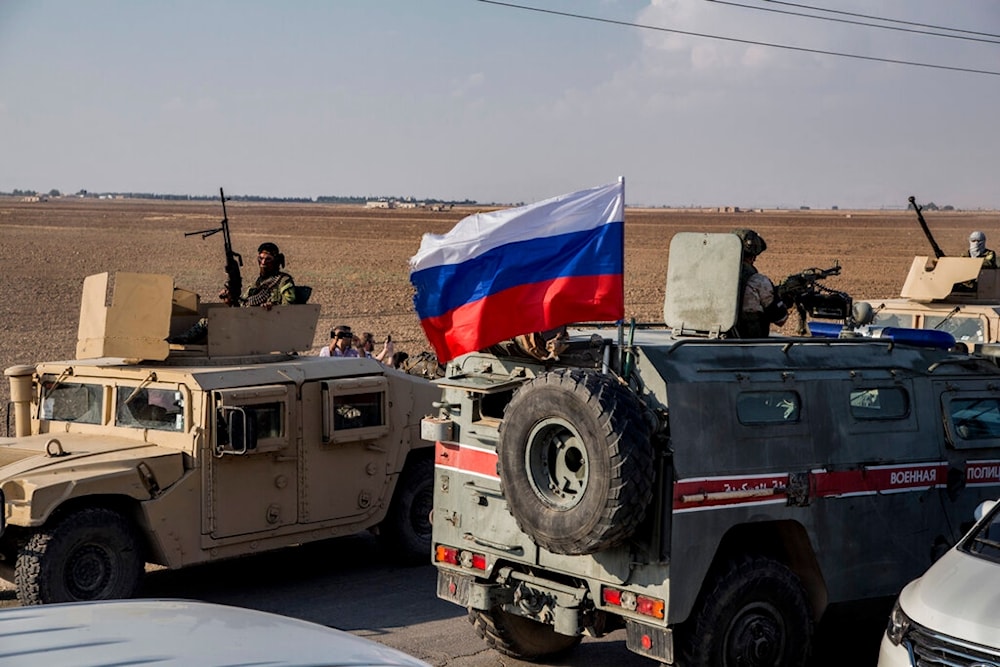'Israel' seeks to maintain Russian presence in Syria: Report
The Israeli occupation is reportedly opposed to a Russian withdrawal from Syria due to the strategic interests its presence serves.
-

Kurdish forces withdraw from an area near Turkish border with Syria, overseen by the Russian forces, near the town of Amuda, Sunday, Oct. 27, 2019 (AP)
Israeli researcher Hayi Cohen said Tuesday that the Israeli occupation and Russia are cooperating in Syria, with the former seeking to prevent Russian forces from withdrawing. According to Cohen, this effort aims to curb Turkish influence in Syria and the eastern Mediterranean.
In an article published by the Israeli newspaper Maariv, Cohen noted that Turkey is particularly concerned about two key issues in its relations with the Israeli occupation. The first is the Israeli occupation forces' activities regarding the Druze population in southern Syria and the establishment of an Israeli buffer zone between the occupied Golan Heights and Damascus, which he claims is intended to function as a Druze autonomous region.
The second issue, he added, relates to the eastern Mediterranean, particularly the Israeli ties to Cyprus and the gas transit systems and other naval activities. Cohen pointed out that, informally, the Israeli occupation and Turkey have become neighbors, leading the former to recognize the need to engage in Turkey’s "war of consciousness."
On Tuesday, the Israeli military spokesperson announced the formation of a new media unit within the Israeli army’s spokesperson’s office. This unit will focus on handling information in Turkish and disseminating content via social media to influence Turkish public opinion, mirroring the Israeli military’s existing media operations in Arabic and Persian.
Cohen further asserted that recent geopolitical shifts in the Middle East following the collapse of the Assad government in Syria have triggered global changes that impact not only the region but also major powers, including Europe, the United States, China, and the East. He identified a "central triangle" comprising Turkey, Russia, and "Israel", as well as a broader triangle including Europe, the US, and Iran.
He also noted that the Israeli regime expects Russian efforts, in coordination with the US, to lead to an agreement restricting Iran’s nuclear activities. Such developments, he argued, could reshape not only the Middle East but also extend their influence to Europe, the US, and even the Ukraine war.
Last week, sources cited by Reuters reported that the Israeli occupation had been lobbying the US to maintain Syria’s instability while advocating for Russia to retain its military bases in the country to counter Turkish influence. This comes as the newly-formed Syrian government seeks stability and attempts to persuade Washington to lift sanctions.
Amidst the war on Gaza, tensions between "Israel" and Turkey escalated, particularly as Turkey backs Syria's new Islamist leadership, which emerged following the deposition of Bashar al-Assad. Israeli officials have been pressuring the US to maintain harsh sanctions on Syria, aimed at preventing the stabilization of the new leadership and ensuring Syria remains fragmented.
According to three US sources and another individual involved in the discussions, "Israel" presented its demands during meetings in Washington in February. These views were reiterated during meetings in occupied Palestine with US Congressional representatives. Two sources noted that "Israel" also distributed a "white paper" to select senior US officials, outlining its strategy for keeping Syria weak.
"Israel's big fear is that Turkey comes in and protects this new Syrian Islamist order, which then ends up being a base for Hamas and other militants," said Aron Lund, a fellow at the US-based think tank Century International.

 4 Min Read
4 Min Read








